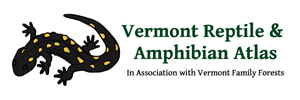When we are searching roads at night for amphibians (and helping them cross the road), it is important to remember that we are there to save individual amphibians and protect populations, and that in order to do that we need to observe some basic rules.
- Never drive through a crossing area. Park at one end and leave the same way. Also, don’t park within the crossing area. Otherwise you may be killing more amphibians than you save.
- Make sure everyone has a bright light with good batteries. Otherwise you may step on and kill more amphibians than you help. There are new LED flashlights that are both cheap and very powerful. Most headlamps and flashlights are too dim to easily see small salamanders.
- Look for the little salamanders and frogs, not just the big flashy ones. Many of the rarer species are only the size of small garden worms. Once again, they are easy to miss and step on.
- Never run. Always watch where you put your feet.
- For your own safety, wear light colored or reflective clothes. It can be very hard for drivers to see you on a dark and rainy night. Assume that motorists do not see you; move out of the road to be safe. Don’t risk your life to save an amphibian.
- Do not visit the crossing area in Monkton where the amphibian underpasses are. Important studies are still going on at that site.
- Once you have visited a known crossing area a couple times, consider finding a new one. It is more useful to find a new and unknown crossing area, than to revisit a known crossing area. There are many. Find a quiet road near a wetland with a forested upland on the opposite side. And then, report the new crossing area, and the species that you found there, to the Vermont Reptile and Amphibian Atlas at VtHerpAtlas.org. If you do not know what you are looking at, take some photos and send them to us.
- Remind others of these guidelines when needed.
We have raised the level of awareness of amphibian migration (a good thing); we now need to be careful that we do not do more harm than good (to amphibians and to you).

